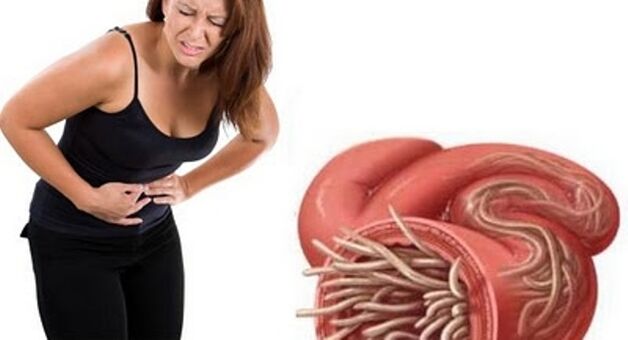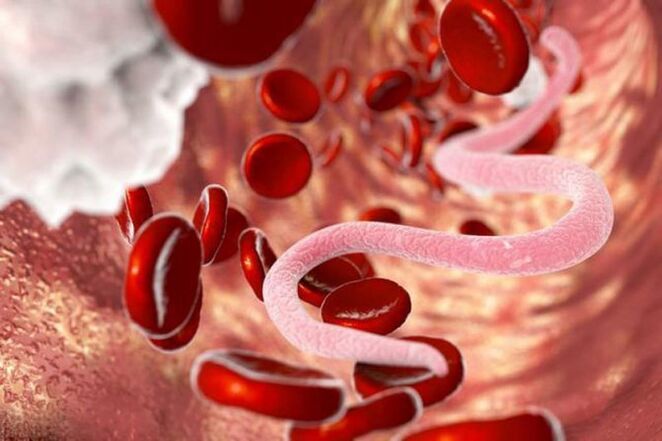
Worms - parasites living in the body (most common in the intestines) of people and animals.You can get infected everywhere: towards doctors, about 80% of people are infected with helminth.
To effectively treated worms in adults, medications must be selected taking into account the type of parasites living in the body.Otherwise, treatment will be inefficient and can harm the patient's health.
Where and how can you become infected with worms?
You can pick up the infection everywhere: in nature, in a catering facility, and even at home.Hominants are transmitted through unwashed hands, poorly washed vegetables and fruits, especially those that grow into the country.
Meat and fish that passed insufficient thermal processing can cause infection.
Helminthoza is transferred from a sick person to a healthy person - through a handshake or contact with saliva.The worms were found in children more often: they are infected through common toys, unwashed hands.
If the family has a child with helminthiasis, all adults were also supposed to pass prevention so that they do not become a re-infection for a child after recovery.
You can infect your pet.Therefore, cats and dogs are required regularly - every three months.And after contact with the homeless, wash your hands thoroughly.
Symptoms indicating the presence of parasites
The signs of the presence of worms in the hose are sharp changes in body weight (weight loss or increase severity due to metabolic disorders), disorders in the digestive system, which are easily confused with acute or chronic gastrointestinal disease.Main signs that show that a person has a helming invasion:

- Chair disorder - diarrhea, prison, liquid chair (when the gut empties no more than 2 times a day, but the chair is not edited).
- Bluing, Colic.
- Nausea.
- Vomiting.
- Lack of appetite.
- Pain and cramps in the intestine.
In the process of vital activity, worms differ toxins that can affect people differently.In some, cause frequent headaches, in others - irritability or food behavior disorder, for third - leather rashes, all types of allergies.
In any case, on the background of herminity invasions, the protective functions of the body are reduced, immunity weakens.Such a person is more likely to suffer from a cold.
Worms: What types are parasitic in people?
Not all types of helmint are dangerous for people: some parasites live only in animal organisms.
About 70 types of Hermimans are parasized in people divided into 3 main groups:
Round worms
A few inches are achieved in length, in the transverse part of their body has a round shape.This is one of the most common types of hermimans.NEMATOD GROUP includes Pinworms and Ascarides, which are most often diagnosed, especially in children.It also includes the Blatoles.Live mostly in the intestines.
Ribbon
The length can reach 18 m, the average length is 1-5 m.The body is flat, on the head there is a suction cup that is attached to the intestinal mucosa.These are ribbons and ribbons that deal with root mainly in a thin intestine, but can be settled in other bodies.Their characteristic characteristic: independent independent, not a larva, falls into the human body: matures in the body of the intermediate host.They are infected with animals, as well as when meat and fish they have suffered insufficient heat processing.
Flat
They have a wide and flat body, reach a few inches in length, less often - one and a half meter.These are various types of bias, bicomer, trematod.They can be settled in channels (biliary, lamable channels and in almost all authorities).
How to determine the presence of Helminthias?

The easiest way is to undergo an analysis of feces.But for precise diagnostics you need to take an analysis 3-4 times, because in the period when parasites are not active, it is quite difficult to detect their presence.
Antits are produced on some types of blood hermimans.According to the blood test, you can determine the presence of these markers and establish the type of worm.But for this you will need to take a few tests - for each expected look.
Who treats Helminthias?
Chief experts for Helia are a specialist for infective disease - an infectious disease.But a regular parasitologist is far from each clinic: usually these experts work as regional clinics and research institutes.
Infectious disease specialist or gastroenterologist based on the test results can prescribe treatment mode.It will help you choose the best antimiles and safe funds for a person to help a fast-powered worm drive without consequences for the body.
Self-help in this case is quite dangerous: the tablets from the worms are quite toxic, have a lot of contraindicates.If the choice of the type of worm, the medicine will at least be inefficient.If the dosage exceeded, Anthelmintics can cause serious poisoning.



























